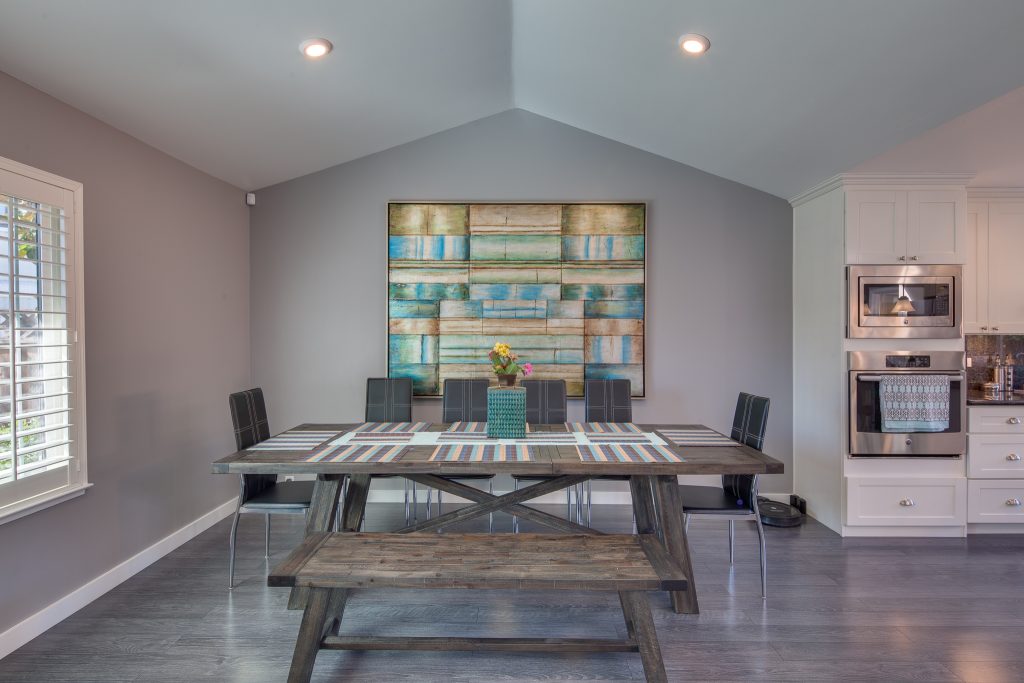Should You Stage Your Home When Selling? Yes, And Here’s Why.
Staging your home may seem like just adding more stress to an already stressful situation. Not only must you think of market issues, and how to move to your new home, you now are thinking of how to present the home to the public before you move out.
In recent years, however, housing and selling techniques have become more strategic. Sellers preparing their home for sale have a great advantage over those simply putting it on the market. They likely will receive not only a higher selling price, but have a shorter time on the market.
The process of staging a home to better appeal to potential buyers has become increasingly popular within recent years.
Stagedhomes.com shows that staged homes average 6 days for selling time on the market versus 48 days nationally.
According to Stagedhomes.com, “in a decreasing housing market, staged homes will sell quicker and for more money than a home that has not been staged. In an increasing housing market, staged homes will sell for even more money.”
What is a Staged Home?
Staging a home includes preparing a residence for sale in the housing market. A staged home entices buyers with a move in ready look. And as we’ve already seen, a staged home will sell faster and for more than a home that isn’t staged.
Most staging techniques are primarily focused on the appearance of the home for sale. They transform the home into a more welcoming environment for potential buyers. Most staged homes include art, paintings, lights, plants and rugs to give the property for sale a more attractive look.
Staged Homes Compared to Unstaged Homes
While it may seem like staging your home is more effort than it’s worth, it has been proven that staging can help potential buyers better visualize the space in your home.
The major difference between homes that are staged and those that are not is more than a difference in overall appearance and ambiance. Homes that have been staged cater to buyers and feature a variety of qualities that could be deemed “buyable” to them. Homes that are not staged either utilize previously owned furniture in its original positioning or are primarily empty.
While staging your home may seem like an added stress, it does come with its benefits.
By neutralizing and clearing out the clutter in your home, buyers can better picture themselves living in the space.
Staging your house can also make you money. According to the National Association of Realtors, “71 percent of sellers’ agents believe a well-staged environment increases the dollar value buyers are willing to offer.”

You can see and feel the difference. It gives the home a warm inviting and almost ready to move in feel. When you are staging your home try to create a warm open feeling.
Another reason staged homes work better than unstaged homes is because of social media. What homebuyer hasn’t looked at Pinterest or Instagram to see what the current home decorating styles are? They want to picture themselves in their home, and the picture they have in mind is what they’ve seen on social media. Your staged home should show them what they want.
How Much More do Staged Homes Sell For?
According to the National Association of Realtors, for every $100 invested in staging your home, the potential return is $400. That’s a 4x return for doing a few simple things! When selling something as expensive as a home this is well worth your time.
“U.S. research states that home staging can reduce a listing’s time on the market by one third to half, and could fetch as much as six percent to 20 percent more than an empty home or a home not properly staged,” an article by nwi.com states.
How Much Does it Cost To Have Your Home Staged?
Staging is all about making your home inviting to a large number of potential buyers. To do this, a property owner must be willing to spend a little extra time and money to make their home as desirable as possible.
According to Kiplinger.com, “Home sellers spend an average of $1,800 to stage a home, but costs can range from a couple of hundred dollars to $5,000 or more.”
The main contributing factor in this being whether or not you have personally staged your home or hired a professional to do so.
Depending on the work that must be done to effectively stage and sell your home, prices may vary; however, most of the time your investment is well worth it in the end.
How do you stage your home?
As practical as home staging sounds at first, many are unsure of where to start. Highlighting the strengths and downplaying the weaknesses of your home is an integral part of the home staging process. Here are 15 tips, provided by HGTV, to best stage your home for potential buyers.
1. Manage Clutter
HGTV lists managing clutter as the most important thing you can do to prepare for selling and staging your home. One of the major contributors to clutter is having too much furniture remaining in your home. Professional stagers recommend having the least amount of furniture possible in your home to make the space look bigger.

2. Furniture Groupings
HGTV’s professional stagers recommend grouping furniture together away from walls. “Reposition couches and chairs into cozy conversational groups and place pieces so that the traffic flow in a room is obvious.” This will help your staged room not only look more inviting, but spacious as well.

3. Feel Free to Move Furniture
Move furniture and décor around whenever you feel necessary. Give your home a whole new feel! By the time you’re done staging you may not want to leave. This will give new life to decorated rooms and will help to present a fresher feel.
4. Room Transformations
If you have a room in your home that only serves to collect clutter, it is advised to repurpose the room to something more meaningful for potential buyers to better connect with. This will assist buyers in seeing the purpose behind every room in the home you are selling.

5. Home Lighting
Lighting is an integral part of staging your home. HGTV attributes well-lit rooms to a more welcoming environment for potential buyers to step into. Because many homes are poorly lit, professional stagers recommend having three types of lighting in staged rooms: ambient (general or overhead lighting), task (under-cabinet or reading lights) and accent (table or wall fixtures).
6. Paint Rooms to Have Them Appear Bigger
To make a room look bigger, HGTV recommends painting it the same color as an adjacent room. “If you have a small kitchen and dining room, a seamless look will make both rooms feel like one big space.”

7. Neutral and Appealing
HGTV advises those interested in staging their home to paint the walls of their living room a neutral color. Bold wall colors have a way of reducing offers from potential buyers because they often distract from the visualization of the room.
8. Experiment with Color
Just because the living room shouldn’t stray from a neutral color pallet doesn’t mean other staged rooms of the house can’t. Don’t be afraid to use darker and more dramatic tones in bathrooms, dining rooms or bedrooms. This often presents the space with a more intimate and dramatic feel. Painting an accent wall with a bold color is also advised to draw attention to a particular portion of room.

9. Vary Wall Hangings
Many feel inclined to place wall hangings on the same invisible line, but professional stagers advise staggering art to promote interest and break up any monotony in a room. “Art displayed creatively makes it stand out and shows off your space.”
10. Accessorizing a Room
Accessories have the potential to pull a whole room together and make it appear more inviting to potential buyers. When it comes to decorating with accessories, grouping objects in odd numbers, preferably three, is often the most appealing to the eye. For maximum effect, accessories should be grouped by color, shape, texture or some other unifying quality, according to HGTV.

11. Raid Your Yard
Most staged homes incorporate fresh flower arrangements to make the space appear more inviting. A budget-friendly option for this is to utilize flowers from your backyard or any surrounding area.
11. Serene and Inviting
Incorporating softer colors into your staged bedroom will make potential buyers feel more at ease when touring your property for sale. HGTV also recommends decluttering your bedroom closet space. This shows off your storage space, which always ranks high on buyers’ priority lists.

12. Try Exchanging Old for New
If new cabinets and other kitchen appliances are out of the question, consider simply replacing the doors and drawer fronts. Then paint everything to match, and add new hardware to your staged kitchen.

13. Finish Unfinished Projects
According to HGTV, unfinished projects are known to scare off potential buyers, so make sure to finish them before selling your home.
14. Decorate Your Bathrooms
Professional stagers recommend having bathroom tile professionally painted to make the bathroom look brand new. Also consider putting out items like rolled towels, baskets and candles to give your bathroom a prim and polished look.

Should You Hire a Realtor or a Professional Staging Company to Assist in Selling Your Home?
Thoughts on this vary, but mostly the question comes up “What’s the difference?!” There could be a lot. Generally sellers chose a realtor they trust, came recommended, and rely on for a turnkey solution – getting their home ready to sell, selling it, and helping them transition out. However, your real estate broker may just be leveraging the contacts they have who will give them a piece of the action. You may find someone who is much cheaper, or better qualified, by finding your own professional staging company. It’s your home, and thousands of dollars, so it may be worth doing some digging.
Peninsula Staging works with both real estate brokers, and the general public. Our clients are varied – from very minimal needs, to elaborate and high-end. We’re happy to give you a free estimate, and give you a customized solution for your needs.
Read more at neighbor.com.


